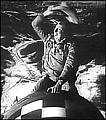Regine’s nightclub, Miami
2:00 A.M., September 3, 1988
As our night on the town was coming to a close and Scotch had loosened Bilgrami’s tongue, he said, “Bob, do you know who the biggest money launderer is in the U.S.?”
“Who?” I shrugged, smiling.
“The Federal Reserve Bank. They are such hypocrites! They know that the Bank of the Republic in Bogota has a teller window known as the ‘the sinister window.’ Under Colombian rule, any citizen who has huge piles of cash can come to that window and anonymously exchange their U.S. dollars for Colombian pesos – no questions asked. This causes the central bank to accumulate palletloads of U.S. dollars that are shipped to the Federal Reserve and credited to the account of the Bank of the Republic—again, no questions asked. The people at the Federal Reserve aren’t idiots. They see this river of hundreds of millions in U.S. dollars being shipped to them from Colombia. They know what generates that cash. That’s drug money that has been smuggled from the U.S. and Europe to Colombia. The Federal Reserve takes that because its good economics for this country’s banking system. The Americans’ so-called War on Drugs is a sham.”
I was floored. If this was true, why were risking our lives?
Later research confirmed Bilgrami’s claim, and I had never felt more betrayed. For the first time, I questioned whether we’d been naďve to think we could make a difference.
- Mazur, pp. 339-340



 But it also had little or no chance of being adopted because it ran afoul of the US military perception/culture at the time and of the ESAF military culture. What made it doable with the ESAF, IMO, is that it could have been bent to meet their cultural perceptions. Unfortunately, I was never in a position to find a champion I could convince to take it up. My bosses in the ESAF Assessment team would have felt (my belief or perhaps excuse) that it was too radical and/or they were not willling to expend the political capital to make it happen after Wag's try at using junior officers and an OCS.
But it also had little or no chance of being adopted because it ran afoul of the US military perception/culture at the time and of the ESAF military culture. What made it doable with the ESAF, IMO, is that it could have been bent to meet their cultural perceptions. Unfortunately, I was never in a position to find a champion I could convince to take it up. My bosses in the ESAF Assessment team would have felt (my belief or perhaps excuse) that it was too radical and/or they were not willling to expend the political capital to make it happen after Wag's try at using junior officers and an OCS.
 Thats bad for the system, it causes Bifurcation right from the start.....you want Unification right from the start.
Thats bad for the system, it causes Bifurcation right from the start.....you want Unification right from the start. Of course John T. is right... this ain't gonna happen.
Of course John T. is right... this ain't gonna happen.








Bookmarks